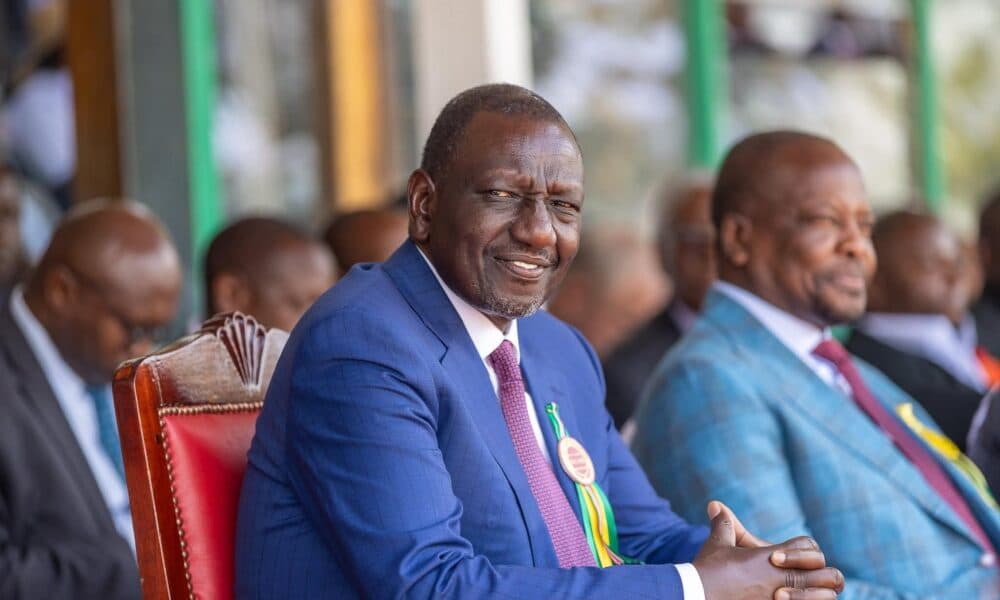We're loading the full news article for you. This includes the article content, images, author information, and related articles.
President William Ruto's administration is championing its labour migration policy as a key economic driver, with diaspora remittances projected to surpass KSh 650 billion in 2025.

President William Ruto has consistently defended Kenya's strategy of exporting labour, framing it as a crucial pillar of his economic agenda to tackle high unemployment and boost foreign exchange earnings. The government's push has been bolstered by soaring remittance figures, which reached a historic KSh 1 trillion by November 2025, according to Prime Cabinet Secretary Musalia Mudavadi. These inflows, now Kenya's top foreign exchange earner, surpassed traditional sectors like tourism and agriculture, contributing significantly to household incomes and national development.
The administration aims to send one million Kenyans to work abroad annually and has been actively signing bilateral labour agreements (BLAs) with various countries, including Germany, Saudi Arabia, Qatar, and the UAE, to formalize the process and create more opportunities. President Ruto has stated that these agreements are designed to ensure the legal and ethical treatment of Kenyan job seekers.
Despite the economic justifications, the policy is under intense scrutiny due to alarming and consistent reports of severe abuse, exploitation, and even death of Kenyan migrant workers. Human rights organizations, including Amnesty International and Human Rights Watch, have documented numerous cases of physical, sexual, and psychological abuse, particularly against domestic workers in the Middle East. A May 2025 report by Amnesty International, titled "Locked in, left out," detailed the experiences of over 70 Kenyan women in Saudi Arabia who faced conditions amounting to forced labour and human trafficking. Testimonies revealed workers being subjected to 16-hour workdays, denial of rest, confiscation of passports, wage theft, and brutal physical and sexual assault.
Data from Kenya's Ministry of Labour and Social Protection presented to Parliament in March 2025 showed 234 documented cases of abuse against Kenyan migrant workers between 2019 and early 2025, with countries like Lebanon, Myanmar, and Saudi Arabia being prominent locations. Between 2019 and 2021 alone, the Ministry of Foreign Affairs reported that 90 Kenyans died in Saudi Arabia.
A significant part of the problem lies with the recruitment process. Many workers are deceived by rogue agencies with false promises of high salaries and good working conditions. A recent investigation by the New York Times, published on November 14, 2025, implicated senior government officials and their associates in owning or being linked to these recruitment firms, raising serious conflict of interest concerns. The report alleged that the government has prioritized the revenue from remittances over the safety of its citizens.
The Kafala (sponsorship) system, prevalent in many Middle Eastern countries, is a major contributing factor to the vulnerability of migrant workers. This system legally binds a worker to their employer, restricting their ability to change jobs or leave the country without the employer's permission, which facilitates exploitation. Critics argue that while Kenya has signed BLAs, their implementation and enforcement have been weak, leaving workers unprotected.
The Kenyan government has acknowledged the challenges and states it is taking steps to mitigate them. These measures include revoking the licenses of hundreds of rogue recruitment agencies and requiring licensed firms to pay a security bond for repatriation purposes. The creation of a State Department for Diaspora Affairs in 2022 was also intended to address the welfare of Kenyans abroad.
Parliament's Committee on Diaspora Affairs and Migrant Workers has been actively investigating the issue, holding engagements with various stakeholders to streamline the management of migrant workers. A new Labour Migration Management Bill is currently under consideration in the Senate. This bill aims to create a comprehensive legal framework to manage labour migration, regulate recruitment agencies more effectively, and protect the rights of workers. President Ruto has also publicly pledged to clean up the labour export sector to eliminate human trafficking and ensure adherence to international best practices, particularly in light of new agreements with countries like Germany.
However, human rights groups and activists maintain that these efforts are insufficient without a fundamental overhaul of the system, including the full implementation of existing policies, greater transparency in bilateral agreements, and holding abusive employers and complicit agencies accountable. As Kenya continues to rely on labour exportation as an economic strategy, the challenge remains to balance the significant financial gains with the profound responsibility of protecting its citizens from modern-day slavery.
Keep the conversation in one place—threads here stay linked to the story and in the forums.
Sign in to start a discussion
Start a conversation about this story and keep it linked here.
Other hot threads
E-sports and Gaming Community in Kenya
Active 9 months ago
The Role of Technology in Modern Agriculture (AgriTech)
Active 9 months ago
Popular Recreational Activities Across Counties
Active 9 months ago
Investing in Youth Sports Development Programs
Active 9 months ago